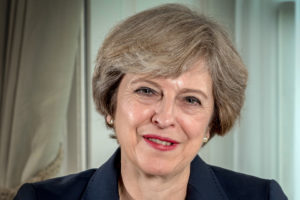Prime minister Theresa May set out her vision for the movement of goods post-Brexit in a speech at the Mansion House in London on Friday (2nd March), re-iterating her desire that UK-EU border trade should be as frictionless as possible.
“That means we don’t want to see the introduction of any tariffs or quotas. And – as the Secretary of State for Exiting the European Union set out in his speech in Vienna last week – we must ensure that, as now, products only need to undergo one series of approvals, in one country, to show that they meet the required regulatory standards.”

Picture by Andrew Parsons / i-Images
May said the UK would need to make a strong commitment that its regulatory standards will remain as high as the EU’s. That commitment, in practice, will mean that UK and EU regulatory standards will remain substantially similar in the future.
“Our default is that UK law may not necessarily be identical to EU law, but it should achieve the same outcomes. In some cases Parliament might choose to pass an identical law – businesses who export to the EU tell us that it is strongly in their interest to have a single set of regulatory standards that mean they can sell into the UK and EU markets.
And she said that if the Parliament of the day decided not to achieve the same outcomes as EU law, “it would be in the knowledge that there may be consequences for our market access”.
May also accepted there would need to be an independent mechanism to oversee these arrangements.
UK negotiators will also want to explore with the EU, the terms on which the UK could remain part of EU agencies such as those that are critical for the chemicals, medicines and aerospace industries, which would mean abiding by the rules of those agencies and making an appropriate financial contribution.
On customs, May repeated the two options first set out last year.
“Option one is a customs partnership between the UK and the EU. At the border, the UK would mirror the EU’s requirements for imports from the rest of the world, applying the same tariffs and the same rules of origin as the EU for those goods arriving in the UK and intended for the EU. By following this approach, we would know that all goods entering the EU via the UK pay the right EU duties, removing the need for customs processes at the UK-EU border.
“But, importantly, we would put in place a mechanism so that the UK would also be able to apply its own tariffs and trade policy for goods intended for the UK market. As we have set out previously, this would require the means to ensure that both sides can trust the system and a robust enforcement mechanism,” she said.
“Option two would be a highly streamlined customs arrangement, where we would jointly agree to implement a range of measures to minimise frictions to trade, together with specific provisions for Northern Ireland. First, measures to ensure the requirements for moving goods across borders are as simple as possible. This means we should continue to waive the requirement for entry and exit declarations for goods moving between the UK and the EU.
“And we should allow goods moving between the UK and the rest of the world to travel through the EU without paying EU duties and vice versa.
“Second, measures to reduce the risk of delays at ports and airports. For example, recognising each other’s “trusted traders” schemes and drawing on the most advanced IT solutions so that vehicles do not need to stop at the border.
“Third, we should continue our cooperation to mitigate customs duty and security risks.
“And fourth, measures to reduce the cost and burden of complying with customs administrative requirements, including by maximising the use of automation. And recognising the unique circumstances in Northern Ireland, and our shared commitments to avoiding a hard border, we should consider further specific measures. 80 per cent of North-South trade is carried out by micro, small and medium sized businesses.
“So for smaller traders – who as members of the community are most affected but whose economic role is not systemically significant for the EU market – we would allow them to continue to operate as they do currently, with no new restrictions. And for larger traders we would introduce streamlined processes, including a trusted trader scheme that would be consistent with our commitments.
“Both of these options for our future customs arrangement would leave the UK free to determine its own tariffs with third countries – which would simply not be possible in a customs union,” she said.
May’s speech was welcomed by David Dingle, chairman of Maritime UK, said: “Her commitment to prioritise as frictionless trade as possible is welcome. What we urgently need now is for both sides to agree the terms of the transition agreement. Business needs certainly and stability.”
“Negotiations are two-sided and always require compromise. We welcome the Prime Minister’s realistic comments today and call for the European Union to show similar realism in getting a deal that works for both sides.”
”






